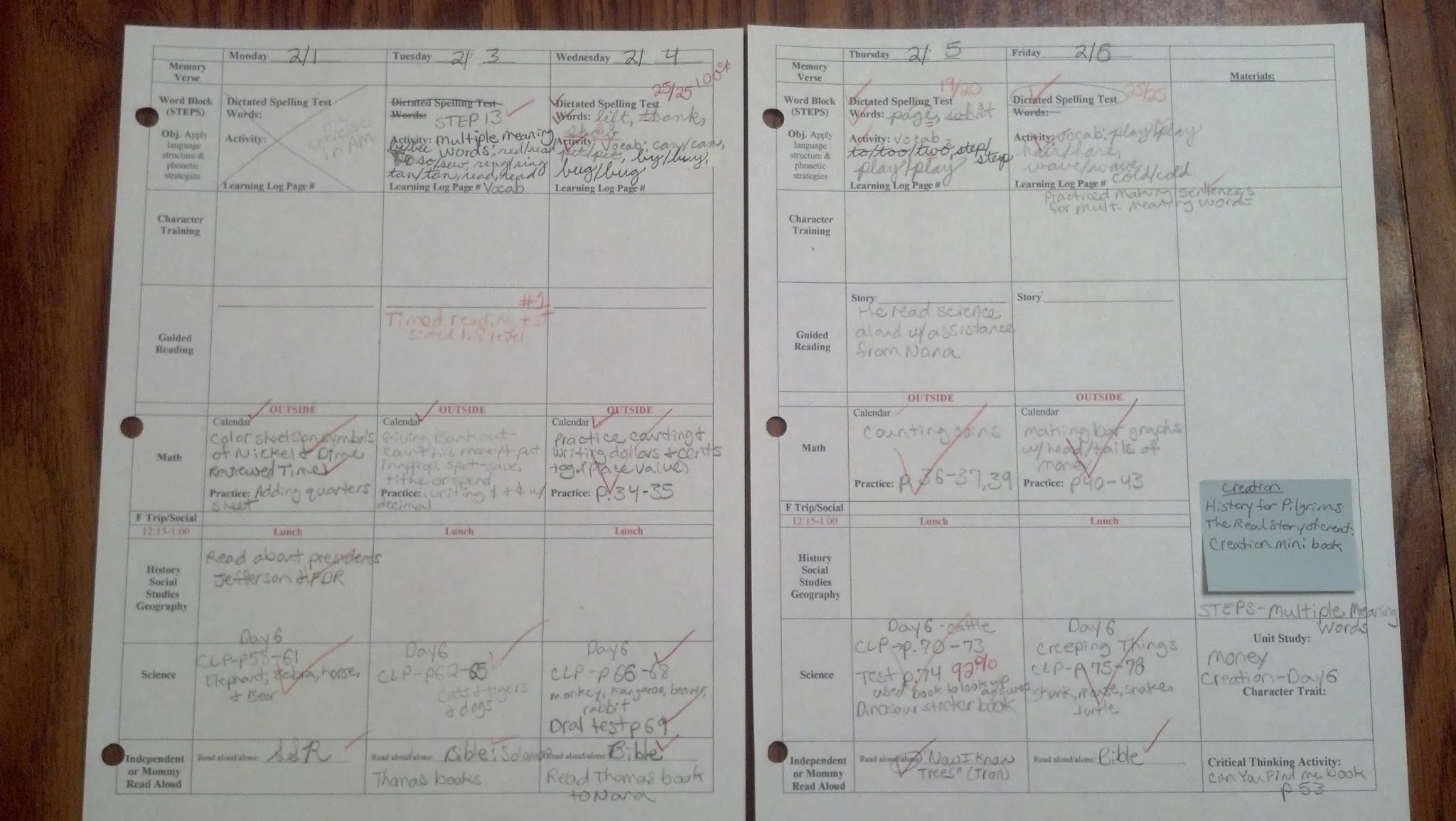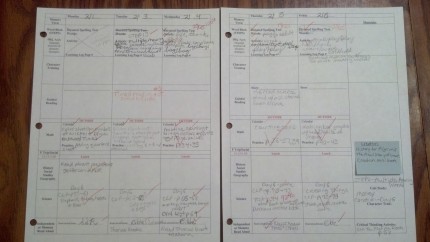Podcast: Play in new window | Download
Subscribe: Apple Podcasts | RSS
Podcast Episode 16 show notes.
This week we had a few homeschooling families over for dinner and the topic of school planning came up. As I shared how my method has changed over the years, my husband noticed the nodding heads (of mostly the husbands!) How is it that us wives stress out so much over lesson plans?! I have a couple of theories and some possible solutions.
Theory 1
Temperaments! I know that I go back to this frequently but it is integral to understanding how God wired us up AND to understanding our strengths/weaknesses. If you will recall from episode 10, the Choleric & Meloncholoy temperaments are the task focused temperaments and they like to have a PLAN! Melanchologies are also perfectionists and love their Sticky Note “to do” list. I believe it is a natural tendency to be stressed when life (AKA school planning) is unplanned. Yes, God does work on our weaknesses but it is a process!
Theory 2
I think our goals/purpose for homeschooling causes (or at least contributes to) the stress we experience in the area of school planning. This goes back to our discussion in episode 2. When our purpose in homeschooling is academic greatness rather than training their hearts and character in the ways of the Lord, then a natural side effect is pressure- sometimes extreme pressure- to find THE BEST curriculum, plan out GREAT lesson plans, and implement those plans! A good antibiotic for this is realizing that NO MATTER how hard you try, you WILL have gaps in your child’s education because it is not possible to teach your child every academic knowledge and skill there is. Despite the effort of “trained educators”, the same is true for them too- I’ve also been in that camp! But what you can teach them is how to love the Lord, obey HIM and exhibit Godly character…knowing that these things will follow them well in life and any laking skills or knowledge can be quickly obtained. Employers can’t train character but they can train skills.
THE “SCHOOL” METHOD
My college training ingrained in me a method of creating lesson plans where it was written out what would be accomplished everyday in each subject and the learning objectives/state standard for each lesson. These plans were kept in a book on my desk where the school administrators could view them at any point in our day. In addition to the weekly plans, I also had a “long range plan” of the skills I had to teach and how that was going to fit for the year.
There is nothing wrong with this type of planning in your homeschool, if it works for you. This is how I started in my homeschooling until I started spending more time revising it than I did implementing it or creating it in the first place! You can look at an example of those plans on the shownotes. This method of planning will be more difficult if you have a lot of context situations (as discussed in episode 11). Another difficulty to this level of detail and planning in advance is that it works for the Choleric & Melancholy (task oriented) temperaments but not so well for the people oriented.
The Lord revealed another method that has been working well for me. I like to call it a “Completed Work record”.
COMPLETED WORK RECORD – for daily plans
I started writing down everything we did in a school day AFTER it was completed. I have found that my life is much easier when I am electronically connected so I started using Google Docs to keep a record of daily work completed for each child. I will print these records out at the end of the year to include in their school work portfolios.
Benefits:
It has reduced the amount of frustration and time I spend revising daily written lesson plans–tremendously! I can edit the electronic record any where (and any time I have a few minutes). Plus I can cut and paste…a nice feature to have!
The best benefit has been the relief of stress to “keep up with my plans”. (Again, this is coming from a task-oriented temperament as opposed to a people-oriented person who actually does need more structure.) Using this method, I have been better able to put a halt on school to deal with attitudes of the heart which need training- which is my primary focus for home educating my children. I don’t get so frustrated and overwhelmed at seeing my week of beautiful lesson plans crossed out or with arrows marked all over simply because I had to deal with outright defiance, temper tantrums, or lack of personal responsibility!
PLANNING FOR THE WEEK OR MONTH
History and science are the easiest for me to plan because they naturally lend themselves to units or sections. These smaller chunks can be broken down into a weekly flow of activities. To give myself flexibility, I write down the order of activities to complete a unit and sometimes I break it down to “Day 1”, etc. If I don’t complete all the activities for that day, or I over plan, then it is at the top of the list to do on the next day. It can be likened to creating a sequence. I try to plan a unit at a time but sometimes life gets in the way and I end up planning a week. I do try to know where I am heading in the curriculum. Math gets done one lesson at a time and is little planning though that varies by curriculum. I tend to use history and science books for me to read aloud or for my child to read to me/brothers. I do a phonics/spelling/handwriting program, called STEPS, that is already broken into lesson and activity and easy to plug in wherever I need. Piano is practiced daily with a lesson once per week. “Daily GRAMS”(English/editing) and Bible are done almost daily. Other subjects like art, writing, PE, Geography, Latin, Bible/Character Club are done at our co-op once a week with the homework being done at home (but NOT ALL of these subjects are done every year!)
WHAT I AM NOT SAYING
I am not saying you should not plan at all. To think that you can embark on such a huge task of home educating your children without any plan at all is hugely nieve and risky! I am not saying you should be lazy in your planning or not teach your children valuable skills. They must learn the basics like reading, writing, and math. But does that mean your child is doomed academically if he/she doesn’t know all his vocabulary, know where Tanzania is in his/her head, or doesn’t remember all the facts of the Golden Age of Greece? No. Be wise, be purposeful, but also flexible.
What a relief to trust in my Lord and Savior to equip these children in skills they need to fulfil His purposes.
Links mentioned in this episode: Donna Young’s Lesson Plans
Subscribe:
You can subscribe to this podcast via iTunes and/or RSS below:



